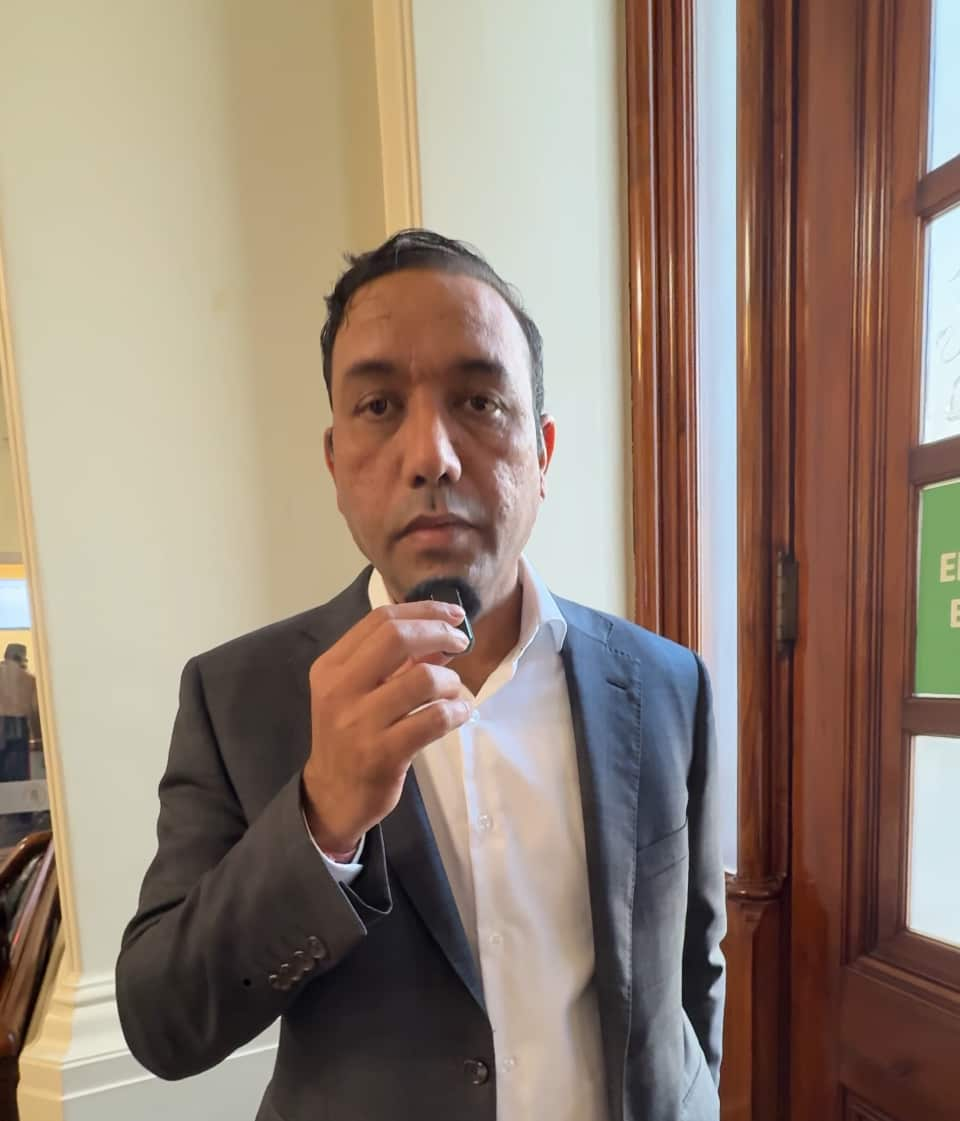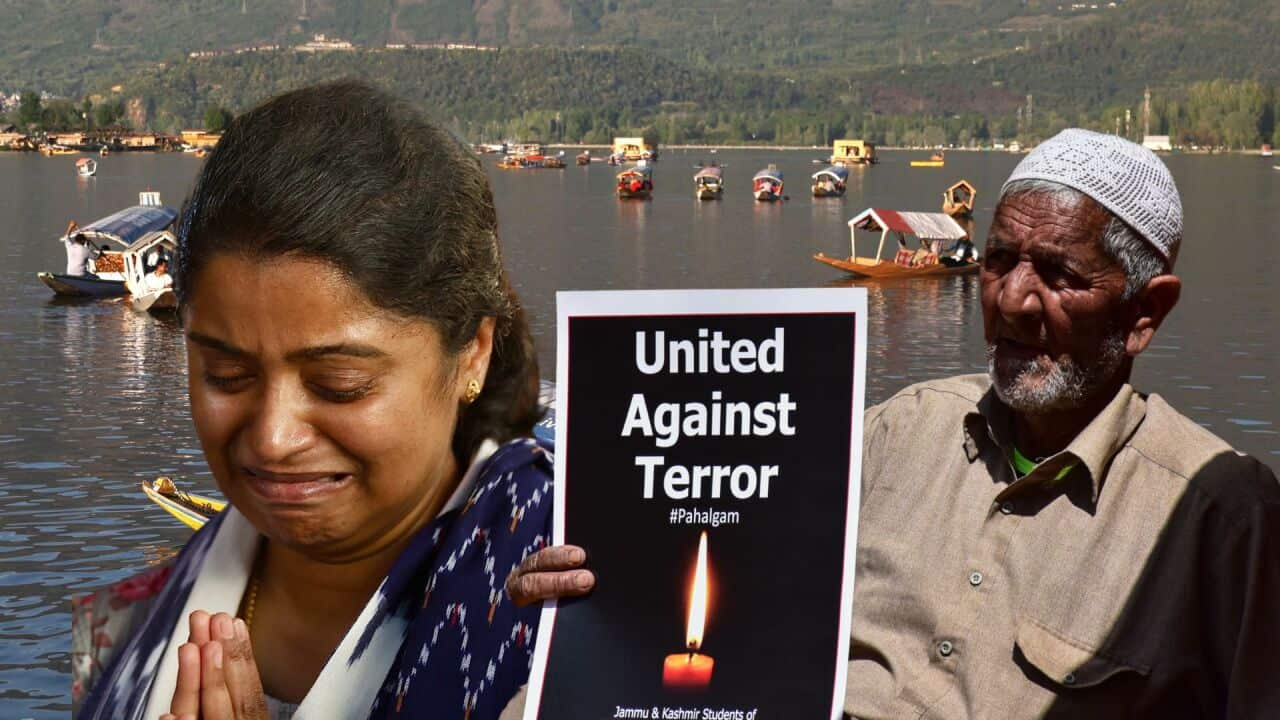Key Points
- Tensions between India and Pakistan have escalated following an attack on Indian tourists on 22 April, which left multiple people dead and many others injured.
- Australia has updated its travel advisory for both countries, but kept the risk levels unchanged.
- Vigils and protests have been held across Australia, with an expert urging support for India during this difficult time.
The attack in the Baisaran Valley, a popular tourist destination known as 'Mini Switzerland', also left several people injured after four armed men reportedly opened fire on tourists and began killing.
Attack in Baisaran Valley sparks tensions
After the attack, India launched an extensive search operation throughout the Kashmir valley.

Indian soldiers in Kashmir, where civilians were killed in a suspected militant attack. Source: SIPA USA / Hindustan Times/Hindustan Times/Sipa USA/AAP
Pakistan has firmly denied any involvement, but the latest attack has deepened the rift between the two countries.

Pakistan's Prime Minister Shehbaz Sharif (centre) and Army Chief General Asim Munir (left). Credit: AP/AAP
Vigils and protests across Australia
Across Australia, the incident has triggered vigils and protests, including in Melbourne, Canberra, Perth, Brisbane, and Sydney.
Melbourne resident Harshad Kale, who attended a protest at Federation Square, described the attack as "barbaric" and called for swift action.

Harshad Kale, a Melbourne resident who attended the Kashmir attack protest in Federation Square. Credit: SBS Hindi
Another protester, Australian resident Ritu Sethi, echoed these sentiments, saying "enough is enough" and calling for much stronger government action.

Ritu Sethi, an Australian resident who attended the Kashmir attack protest. Credit: SBS Hindi
"We want the Australian government to stand with India during these challenging times."
Australia updates travel advice for India and Pakistan
Just after the attack, several Australian leaders — including Prime Minister Anthony Albanese, Opposition Leader Peter Dutton, and Foreign Minister Penny Wong — expressed their sympathies to those affected.
Australia also moved quickly to update its travel advice for both India and Pakistan.
"Travel advice for India and Pakistan was updated on 25 April 2025 to reflect the closure of the international border crossing between Pakistan (Wagah border) and India (Attari border)," the Department of Foreign Affairs and Trade (DFAT) told SBS Hindi.

Indian soldiers keeping watch at the Indo-Pakistan border near Atari Station. (Representative image) Credit: AAPIMAGE
Australians are advised to exercise a high degree of caution when travelling to and are urged to reconsider their travel plans to .

The scene in Kashmir after the attack in Pahalgam on 22 April 2025. Source: EPA / FAROOQ KHAN/EPA/AAP
'India-Pakistan relations are at an all-time low'
International relations expert Professor Amitabh Mattoo says ties between India and Pakistan have plunged to an all-time low.
LISTEN TO

'We are in mourning': Kiran Bedi, who found 'deep peace' in Kashmir, grieves after the Pahalgam attack
SBS Hindi
07:39
"This was an unprecedented attack — a sign of sheer desperation from those who want to destabilise the country," he said.
"We are already seeing a war-like situation on the ground, and a military exchange cannot be ruled out."

Professor Amitabh Mattoo, the former director of the Melbourne-based Australia India Institute (AII). Source: Supplied / Supplied by Amitabh Mattoo
"Drawing parallels or equivalences between the two countries — India and Pakistan — will only damage Australia’s relationship with India," he warned.
He added that Australia should view the attack not just as a strike against India, but as an assault on democracy itself — and by extension, a threat to the shared values underpinning alliances like the Quad.
As part of its diplomatic response, India has shut down the main border crossing with Pakistan, cancelled visas issued to Pakistani citizens, suspended consular services, and put the Indus Water Treaty — a decades-old agreement governing the sharing of the Indus River and its tributaries — on hold.
In response, Pakistan has closed its airspace to Indian airlines and denied any involvement, calling for a neutral investigation.
According to , a politico-strategic analyst and author of several books on Kashmir, the attack was the latest in a long-simmering territorial dispute over the region.
"For India, J&K is an integral part of the country, justified by the fact that J&K’s ruler acceded to India in 1947," he writes.
He further adds that Pakistan does not actually claim Jammu and Kashmir, but "it wants a United Nations plebiscite held so that those living in J&K can determine whether their state, in its entirety, will join Pakistan or India."
Find our podcasts here at . You can also tune in to at 5pm on on digital radio, on channel 305 on your television, via the or stream from .












